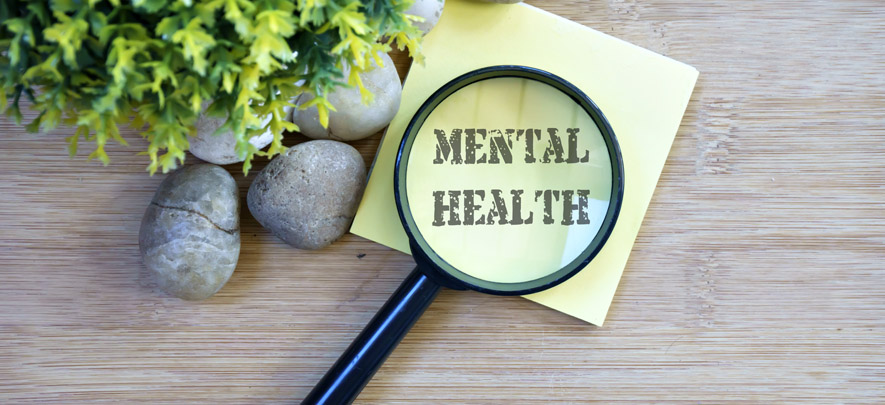4 ways to take care of yourself and improve your mental health during the coronavirus crisis

Health & Lifestyle
233 week ago — 7 min read
You don’t have to be at the frontline of the coronavirus crisis to feel its effects. Whether it’s due to economic uncertainty or potential job losses, essential goods shortages or health concerns – everyone is experiencing emotions like worry, anxiety and panic. In addition to cases of coronavirus infections, cases of mental or psychological ill-health caused due to the crisis are on the rise as well, putting further pressure on healthcare systems that are already stretched close to breaking point.
The current pandemic has created a fearful spectre of uncertainty and worry but we can help alleviate it by deepening our emotional reservoirs and shoring up our own mental health.
That’s why it is so important that we take care of the psychological well-being of our loved ones and of ourselves. As social distancing and national lockdowns continue, we need to make sure that we find ways to address mental health impacts like forced isolation, loneliness, depression and even suicidal tendencies. The current pandemic has created a fearful spectre of uncertainty and worry, but we can help alleviate it by deepening our emotional reservoirs and shoring up our own mental health.
Try these suggestions to improve your mental health during the Coronavirus crisis.
1. Take care of yourself before you take care of others
Self-care is not just for the rich, idle or self-indulgent. As the Coronavirus crisis goes from strength to strength, caring for the self is essential. And this starts with taking a quick scan of our own mental health. Ask yourself, how am I feeling today? Anxious? Worried? Stressed? Depressed? Am I eating and sleeping okay?
Once you know where you currently are, you will understand what you can do to feel better. You can then create a plan to get there. Make sure your plan is practically achievable. It’s also important to anchor yourself in routine as you follow the plan. Fix a time for waking up in the morning and for going to sleep at night. Schedule your work day and stick to it. Take a shower in the morning, exercise and eat a healthy breakfast. Stay hydrated throughout the day.
Be mindful of what you think, say or do. Limit your exposure to TV and newspapers if news of the crisis distresses you. Also limit your social media exposure.
Explore ways to stay mentally engaged and alert. Reading, listening to music, dance exercise and puzzles – pursue whatever works best for you.
Spend a little time every day on self-reflection. Start a journal or blog. Meditate.
Find ways to stay connected with others. In current times, social distancing is crucial. But this does not have to mean loneliness and disconnectedness from humanity. Call a friend or relative if you feel low. Send funny memes to your friends through WhatsApp. Schedule a Zoom meeting with colleagues.
Also read: 10 ways to love yourself better
2. Ask for help
You are stronger than you think. However, no one can be strong all the time. If you are struggling with something, don’t feel that you need to pretend to be stronger or more put-together than you really are. It’s absolutely okay to ask for help. After all, you are human, just like everyone else!
If you bottle up your feelings for a long time, it will affect your health and well-being in unpleasant ways. Discuss your worries and concerns with your partner, a friend or a family member. If required, seek professional support from a counsellor or mental health practitioner.
Do remember that practicing self-care does not mean being self-centred. One of the best ways to lift your own mood is to encourage and support others. Which brings us to the next point.
3. Acknowledge the needs of others and find ways to help
During a crisis, it is natural to feel the weight of the world on our shoulders. You may feel that your suffering is unique and unending but the fact is, it is neither. We are all in a crisis and we are all in it together.
If you feel okay mentally and psychologically, take some time out of your day to ask others, “How are you doing today?” In ‘normal’ times, this is often a pro forma question that elicits a knee-jerk reaction: “I’m fine, thanks”. But there’s nothing normal or routine about current times. So when you ask this question, make sure you let the other person know that you are there for them if they need to talk. In other words, make them feel heard. A response like “I’m fine, thanks” may have hidden nuances and meanings that won’t be immediately obvious. Pay attention to what is not being said.
Take the time to listen to others without judgement or interruptions. Offer advice only if asked. Most times, people don’t necessarily require advice or inputs. They just want someone to vent their feelings to. Be that someone. It will be worth it – for them and for you.
4. Look for the positives and make expressing genuine gratitude a habit
This is sane advice that is not just applicable to times of crises but to life in general.
Even if you are isolated from others and forced to work from home, you can surely find things to be grateful for, especially if you:
- Still have a job and a roof over your head
- Get a regular supply of groceries and medicines at your doorstep
- Have neighbours or friends who check in on you regularly
- Have friends and relatives who send you funny messages to cheer you up
- Live in a building or society that arranges free games and other activities to entertain the community
You are so much luckier than millions of refugees, migrant workers, healthcare professionals and hygiene workers. Be grateful!
In addition to looking for the positives in your situation, it is also important to look for the positives in people. Express appreciation for others, give compliments, encourage them when they are down and call out their triumphs. If you see, hear or experience something good due to someone else, acknowledge it and say thank you. Big wins are in short supply right now, but even small wins matter. Be the person who brings these wins to others.
We still have a long, hard path ahead of us. But if we take care of our mental and emotional health, we will be better prepared for upcoming challenges. Take good care of yourself. You deserve to be happy and healthy.
Also read: COVID-19 crisis: 3 effective strategies to build resilience
Image source: shutterstock.com
To explore business opportunities, link with me by clicking on the 'Connect' button on my eBiz Card.
Disclaimer: The views and opinions expressed in this article are those of the author and do not necessarily reflect the views, official policy or position of GlobalLinker.
Posted by
Lion Amir ViraniTech Evangelist| Thought Leader | Social Entrepreneur | Enthusiastic Networker | Speaker| Startup Mentor
Most read this week
Trending
Ecommerce 3 days ago















Comments
Please login or Register to join the discussion